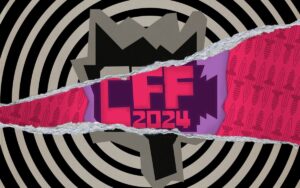
Upon joining the Jackass crew for JACKASS FOREVER, Rachel Wolfson observed that part of the reason it had taken so long for a woman to be added to the Jackass roster was that nearly every physical act a woman can perform will be sexually fetishized. If Steve-O lies stark naked and has someone cover his genitals with honey so that bees will swarm, it’s a funny demonstration of physical endurance and absurdist humor. If a woman does the same thing, then it’s “hot” and likely behind a pay wall and subject to the scrutiny of an audience that dehumanizes the performer.
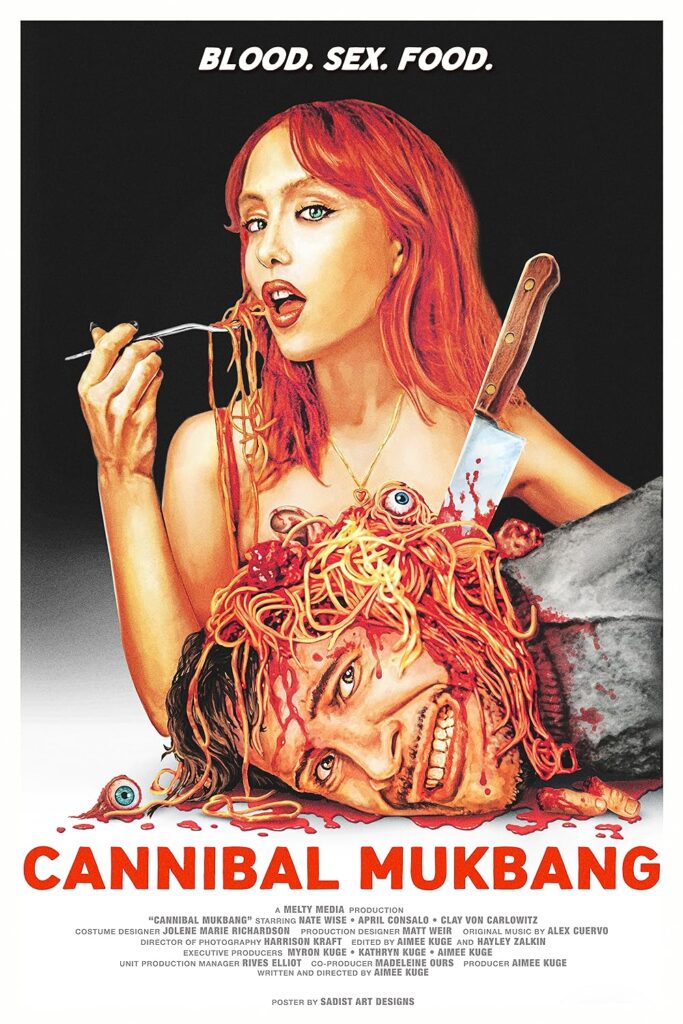
Aimee Kuge’s brilliant CANNIBAL MUKBANG never lets the audience lose sight of how women’s mere existence in public spaces is sexualized. The central female character in the film, Ash (April Consalo) is a mukbang* YouTuber. One only has to take a look at the comment section of any femme-presenting mukbang YouTuber to see that the audience is primarily there for sexual gratification and parasocial intimacy. Watching someone eat allows them to imagine a relationship where someone would eat in front of them informally. It’s the same kind of hell as ASMR YouTube — all whispers and eye contact.
Consalo’s Ash is extraordinary. There’s a remoteness in her performance that makes the warmth and coquettish displays seem calculated. This isn’t a criticism of Ash. We all exist in a late-capitalism hellscape where the phrase “side hustle” was invented to obscure that a single job isn’t enough to house a person anymore. Ash eats food online and sexually teases a male audience to survive. There are moments when Ash’s real warmth or real frustration bubble to surface, unable to be hidden, and the audience wishes for a world safe enough that she didn’t have to mask or perform. Whenever she playfully calls out “Hey, Brain Damage!” to Mark (Nate Wise), we hear the real Ash.

When we meet Mark in the film, he is shambling through a convenience store late at night. He sees a pretty woman, Ash, and immediately ducks below the height of the shelving. I love this as an introduction for this character, because it can be read at least three different ways. Were this strictly a romantic comedy meeting a character demonstrating this kind of bashful shame, it would be endearing. We would realize that his hero’s journey over the course of the film was about learning to like himself enough to allow him to be with the female lead. In a horror film, this same kind of behavior would be applied if the protagonist was trying to hide from a killer or monster in the bodega. We’re not too far removed from SCREAM VI’s convenience store shotgun-toting Ghostface. Lastly, let’s examine what it would represent if a man in a convenience store immediately hid if a woman made eye contact with him. It’s creepy, predatory, incel-style behavior. Hiding in this way is an insistence by a man that he can observe, but not be observed. I’m reminded of the construction worker sequence in PROMISING YOUNG WOMAN where Cassandra (Carey Mulligan) confronts the construction workers leering at her. With their predatory behavior observed, they wilt.
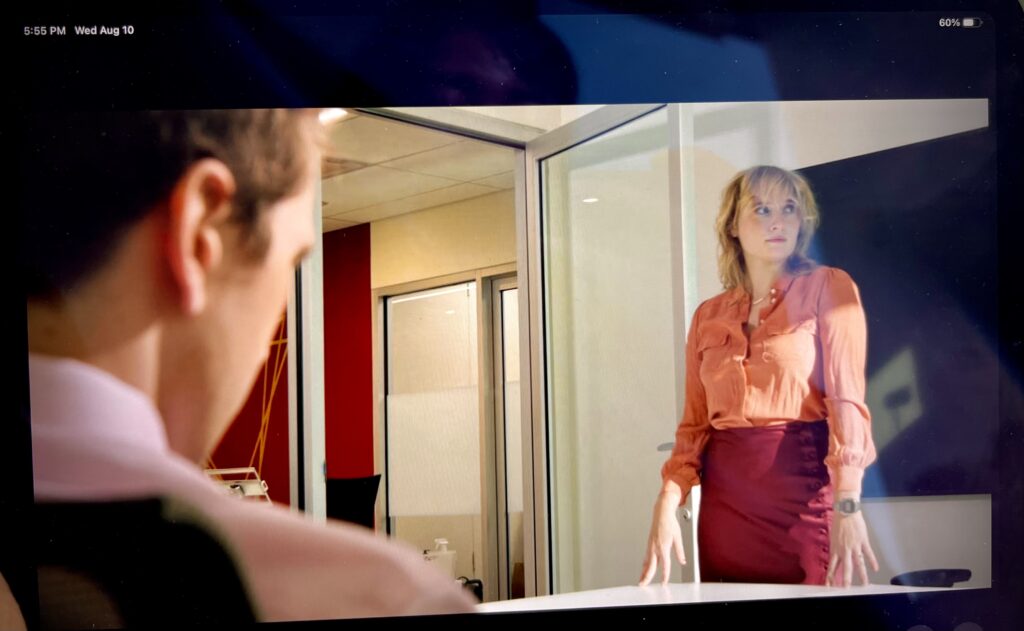
CANNIBAL MUKBANG spends most of its time rooted in Mark’s POV. He seems to have a few key modes that he repeats. He listlessly lays around his apartment, sometimes taking calls for his work-from-home customer service job. Sometimes, he is meeting with his therapist via teleconference that he is less than transparent with. On occasion, he is spending time with his brother “Maverick” (Clay von Carlowitz), who seems like an escapee from a Todd Phillips film. I’ve marveled at any readings of this film that find Mark to be a sympathetic character. From the jump, he’s shown to be a self-interested, insecure parasite who uses the word “sorry” as his way to feel out a path where he can take the most with the least consequences. There’s a scene near the end of the first act of the film where Mark is out on a date with a young woman, and he is impossibly rude. He ends their date without warning, and frames it as a favor to her. By co-opting and appropriating the language of the emotionally self-aware, Mark is able to do more harm. His date is hurt and flustered, but because of how he framed it, she doesn’t know how to authentically respond. Instead, she just thanks him for being honest. Nearly every interaction he has is like this. Like Consalo’s Ash, moments of outward authenticity only bubble to the top in spurts for Mark. They do so in flashes with his brother and importantly, in the climax, but never with his therapist. At some level, Mark views everyone in the world as either a persecutor or as a rescuer, allowing himself to always be the victim.
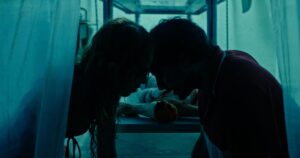
Kuge’s direction pulls of the Herculean task of getting the audience to root for Ash and Mark, even though we know they aren’t good for each other, and that Mark isn’t good in general. We see her brighten and open up as their relationship blossoms, and there are more authentic moments with Mark. Mark literally becomes less pale and at least performs — if not experiences — confidence. Ash’s apartment is decorated with bursts of color, strung gauzy material, and twinkle lights. Backgrounds are busy chaotic patches of color, and shots are blocked well, so as to make every moment feel like it’s bursting with life. Sure, the insert shots of the guts and innards that Ash and Mark eat are gross, but they’re also bright, beautiful and slick in appearance. As they get closer and cheerier, it’s easy to let your mind drift as they prepare food and imagine it’s something else.
The gore and production design are just two courses in a — if you’ll excuse the pun — visual feast. CANNIBAL MUKBANG never feels cheap or falls short of its own ambition in its framing. There’s a shot early on of Maverick in a conference room, when he takes a call from Mark, that is just gorgeous. What’s even more impressive is that when the film has reason to shift narratively to a flashback, it adopts an entirely different visual style and nails it as well. The dialogue is funny, sinister, sexy, and sad, but most importantly, it never lets us lose sight of who these characters are.
Kuge knows these characters. She knows that Ash’s social performance is a survival tactic and a trauma response, and she knows Mark’s mumbled sweaty-faced apologies are actually his worst weapons. These are fully-realized characters in a film that is funny, gross, challenging, and sexy. CANNIBAL MUKBANG delivers. I can’t encourage you enough to see this wonderful film.
*Mukbang is an internet phenomenon where the host eats a variety of food, either pre-recorded or live-streamed. Advocates for mukbang have cited educational value, but criticism of mukbang has grown persistent in recent years, due to food waste and sexualization.
Tags: Aimee Kuge, April Consalo, Cannibal Mukbang, Carey Mulligan, Chattanooga Film Festival, Chattanooga Film Festival 2024, Clay von Carlowitz, Film Festivals, Jackass Forever, Nate Wise, Promising Young Woman, Rachel Wolfson, Scream VI

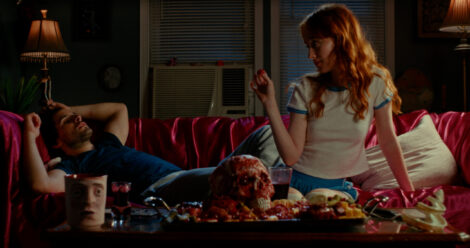

No Comments